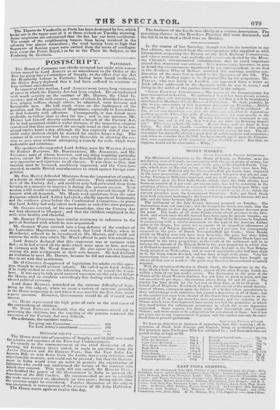POSTSCRIPT.
SATURDAY.
The House of Commons was chiefly occupied last night with a rest,-
lution moved by Lord ASHLEY as an amendment to the Order of the Day for going into a Committee of Supply, to the effect that the Act for Regulating Labour in Factories having been found inefficient, the House deeply deplored that it bad been buffered to continue so long without amendment. In support of this motion, Lord ASHLEY went into a long statement of cases In which the Factory Act had been evaded. He animadverted with much severity on the conduct of Mr. Horner, the Chief In- see
dor •, and of the milLowners ; some of whom he described as merei-
less, griping ruffians, though others, he admitted, were humane and honourable men. He laid much stress on the inadequacy of the penalties, and the disposition of Magistrates, especially in Lancashire, to deal leniently with offenders. Consequently, it was found more profitable to violate than to obey the law; and in one instance, Mr. Horner had himself directly authorized a and of the Factory Act, for he had permitted children under thirteen, if the inspecting-surgeon considered that they possessed the strength usual at that age, to be em- ployed twelve hours a day, although the law expressly stated that no • child under thirteen should be worked for twelve hours a day. The conduct of Government had been very blametible in allowing the ses- sion to pass away without attempting a remedy for evils which were undeniable and notorious.
The speakers who supported Lord Ashley, were Sir WALTER JAMES, Sir ROBERT BATESON, MT. BROTHERTON, Mr. AGLIONBY, and Mr. FIELDEN ; none of whom, however, said any thing requiring particular notice, except Mr. BROTHERTON, who described the present system as very oppressive and injurious to all classes. It was clear to him, that taxation must be lessened, machinery improved, and the Cormlaws repealed, to enable British manufacturers to stand against foreign com- petition.
Mr. Fox Matrix defended Ministers from the imputation of neglect,
or a desire to shield oppressive mill-owners. They admitted the de- fects of the Factory Act ; and accident only had prevented them from bringing in a inensure to improve it during the present session. Next session, a bill would certainly be introduced, and pressed through Par- liament with all despatch. Mr. Maule read quotations from the same documents which Lord Ashley had cited—chiefly reports of Inspectors, and the evidence given before the Combination Committee—to prove that Lord Ashley had only taken such parts as suited his own purpose.
Mr. GILLON asserted, of his own knowledge that the Factory Act was duly observed in Glasgow ; and thut the children employed in the mills were healthy and cheerful.
Mr. ROBERT FERGUSON bore similar testimony in reference to the parts of Scotland with which he was acquainted.
Mr. GEORGE WOOD entered into a long defence of the conduct of the Lancashire Magistrates ; and stated, that Lord Ashley, when in Manchester, refused to be introduced to Mr. Horner, and would not examine the mills into which Mr. Wood offered to gain him admission.
Lord ASHLEY declared that this statement was at variance with fact ; as he had visited all the milk which were open to him, and one in company with Mr. Wood himself. He also spent his evenings in visiting the poor workpeople at their own houses. He had declined an invitation to meet Mr. Homier, because he did not consider himself free to act with that gentleman.
Mr. O'CONNELL disapproved of legislation for adults en this ques- tion, though he would protect infants. He called upon Lord Ashley, if he really wished to serve the labouring classes, to repeal the Corn. laws. It was easy to talk good-natured nonsense on the subject before the House, and to combine exceedingly fine feeling with exceedingly absurd political economy.
Lord JOHN RUSSELL remarked on the extreme difficulty of legis- lating on this subject, when so great a variety of opinions prevailed in the House respecting it, and when it was now for the first time made a party question. However, Government would do all it could next session.
Air. Hustr. represented the high price of corn as the real cause of the overworking of children. Mr. MARK PHILLIPS declared, that the mill-owners would aid in protecting the children, but the cupidity of the parents rendered the exerution of the Factory Act very difficult. On a division, the numbers were—
For going into Committee 121
For Lord Ashley's amendment 106 Ministerial majority Ministerial majority The House went into a Committee of Supply ; and 54,2521. was voted for salaries and expenses of the Poor-law Commissioners.
Previously to the commencement of the chief discussion of the
evening, Sir GEORGE GREY stated, in reply to questions from Sin' JAMES GRAHAM and Sir ROBERT PEEL, that the East India La- bourers Bill, as sent down from the Lords, was a very del.ective and objectionable measure, and could not be pressed ; but that the Govern- ment in India would issue an order to prevent the exportation of labourers who could not understand the nature of the contract into which they entered. This reply did not satisfy Sir Romer PELL ; who doubted the power of the Government in India to prevent the departure of the Hill Coolies. He recommended an net to prohibit the trade now carried on, absolutely For two years ; during which time the question might be considered. Further discussion of the subject Was postponed, in consequence of the absence of Sir John Holahouse.
The House meets again at twelve this day.
The business of the Lords was chiefly of a routine description. The remaining clauses in the Benefices Plurality 11111 were discussed; and the bill is to be read a third time on Monday.


























 Previous page
Previous page